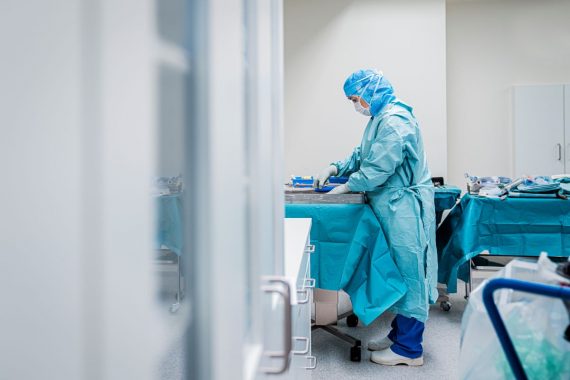Majority of hospitalised coronavirus patients suffer long Covid post-discharge

Most people who were hospitalised with Covid-19 are not fully recovered five months after discharge and face continuing problems with physical and mental health, a large national study has found.
Data on 1,077 patients discharged in 2020 across the UK showed that at an assessment five to six months later, only 29% felt fully recovered.
In a not yet peer-reviewed pre-print, researchers reported that one in five patients had a new disability. Of those who were in work before they fell ill, 19% had to make a change in their job because of their ongoing health problems and 17% were no longer working.
The NIHR-funded PHOSP-Covid study found that each participant had an average of nine persistent symptoms, most commonly muscle pain, fatigue, physical slowing down, impaired sleep quality, joint pain or swelling, limb weakness, breathlessness, pain, short-term memory loss, and slowed thinking.
In addition, more than a quarter of those had clinically significant symptoms of anxiety and depression and 12% had symptoms of post-traumatic stress disorder at the five-month follow-up.
While the magnitude of the ongoing physical and mental health burden was substantial, it was ‘perhaps surprisingly’ unrelated to acute severity of Covid-19, they concluded.
While the profile of patients admitted to hospital with Covid-19 is disproportionately male and from an ethnic minority background, those with the most severe prolonged symptoms tend to be white women aged approximately 40 to 60 with at least two long-term health conditions, such as asthma or diabetes, the researchers said.
The team classified types of recovery into four different ‘clusters’ based on the participants’ ongoing problems.
One cluster group in particular showed impaired cognitive function or ‘brain fog’ and they tended to be older and male. The data suggested a different underlying mechanism compared with other symptoms.
In all but the mildest cases of persistent post-Covid symptoms, levels CRP were elevated, the researchers reported. The evidence for different recovery clusters, and ongoing inflammation, is important in guiding further research into the underlying mechanisms of long Covid, they said.
Another early indication from the research was that while use of corticosteroids is a factor in reducing mortality in hospital, it does not appear to have an impact on longer term recovery.
The study will assess patients again at 12 months.
Study author Dr Rachael Evans, respiratory consultant at Leicester’s Hospitals, said: ‘Our results show a large burden of symptoms, mental and physical health problems and evidence of organ damage five months after discharge with Covid-19.
‘It is also clear that those who required mechanical ventilation and were admitted to intensive care take longer to recover. However, much of the wide variety of persistent problems was not explained by the severity of the acute illness – the latter largely driven by acute lung injury – indicating other, possibly more systemic, underlying mechanisms.’
Chief investigator Professor Chris Brightling from the University of Leicester added: ‘Our findings support the need for a proactive approach to clinical follow-up with a holistic assessment to include symptoms, mental and physical health, but also an objective assessment for cognition.’
Dr Samantha Walker, director of research and innovation at Asthma UK and British Lung Foundation, said the study showed the devastating impact long Covid was having.
‘Almost half (48.1%) of patients reported significant worsening in their breathlessness to the point of disability and the devastating impact of this is something we are hearing time and time again through our own post-Covid research.
‘People with long Covid urgently need support and effective treatments for their symptoms to help them recover as quickly as possible.’
It comes as another recent NIHR review concluded that as many as one in 10 people suffer long Covid symptoms, regardless of the severity of their initial infection. Fatigue was the most common symptom.
Visit Pulse Reference for details on 140 symptoms, including easily searchable symptoms and categories, offering you a free platform to check symptoms and receive potential diagnoses during consultations.









